What is Lottery?

Lottery is a game where people bet a small sum of money in exchange for the chance to win a large prize. It is considered a form of gambling, but it is not as addictive as some other games of chance, and the proceeds are often used for good causes in the public sector. The word lottery derives from the ancient Greek lottery, which was a procedure for giving away property or slaves through a random selection process. Today, lotteries are run in many countries, and they are a popular way to raise money for different purposes.
The most common type of lottery involves a cash prize. The winners are selected by a random draw, and the prizes are usually much higher than would be possible through ordinary sales. This type of lottery has a number of advantages, including the fact that it is very easy to organize and control. Moreover, it can be conducted on a large scale and the profits can be shared among many winners.
Another type of lottery involves a fixed-sum prize, such as a house or car. These are more common in Europe than in the United States, and they can be organized by government agencies or private companies. They can also be a method for raising money to fund public works projects. The term “lottery” can also be applied to an event in which a small group of people receives some prize or other benefit, such as a job interview.
In addition to the main prize, some lotteries offer a range of smaller prizes for a smaller number of ticket holders. The number and value of these prizes depend on the total amount of money collected, the costs of promotion and taxes, and the amount of profit for the promoters. The size of the jackpot is also an important factor in attracting participants.
Some of the most popular lotteries include Powerball, Mega Millions, and Eurojackpot. Each of these has its own rules and regulations. However, there are some basic things that all of them have in common. First, there must be a mechanism for collecting and pooling all of the stakes. Typically, this is done by a chain of agents who pass the money up through the ranks until it is banked.
To increase your chances of winning, select numbers that are not close together. Also, avoid playing numbers that have sentimental value, such as those associated with your birthday. Also, purchase more tickets to increase your odds. However, beware that the additional cost can add up quickly.
After purchasing a ticket, wait for the drawing to take place. The drawing is usually held on a specific date and time. Results are usually published on official websites or broadcast on public access television. When you’re ready to claim your winnings, choose whether to take a lump-sum payout or a long-term payout. The latter option gives you more time to invest the money, which can increase your chances of a greater return.